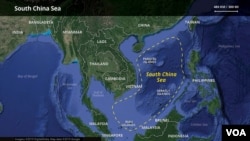Five years after a landmark world court ruling against China’s claims to a disputed sea, smaller Asian countries that contest Chinese maritime sovereignty have learned to live with Beijing's adamant rejection of the verdict, experts in the region say.
China uses a “nine-dash line,” citing maritime records from dynastic times, to claim about 90% of the 3.5 million-square-kilometer South China Sea that other governments value for fisheries and undersea fossil fuel reserves. The nine dashes cut into some nations’ exclusive economic zones.
The Hague-based Permanent Court of Arbitration issued a decision July 12, 2016, rejecting China’s claims as lacking a basis in international law. China dismissed the ruling then, and it did the same again in July this year.
Five other Asian governments that dispute China’s wide-ranging nine-dash line lack the military force or economic clout to require that China’s compliance with the arbitral ruling, while the court itself lacks police powers. At the same time, the rival states accept development aid, investment and trade from China, which has Asia’s biggest economy, along with the strongest armed forces.
China offered money to some maritime rivals after the arbitral verdict to keep the sovereignty issue at bay, analysts said at the time.
Neither the arbitral ruling nor anyone’s reaction to it will change China’s stance on its nine-dash line, so countries are raising the issue cautiously to stay on Beijing’s good side, said Shahriman Lockman, senior foreign policy and security studies analyst with the Institute of Strategic and International Studies in Malaysia.
“I think it’s a very calculated thing that they have to do,” Lockman said. “You say some things that are not pleasant to Chinese ears, but at the same time don’t push it too hard.”
To not raise the ruling at all would imply support for Beijing's claims, scholars have told VOA in the past.
China continues to upset rival maritime claimants by landfilling islets in the contested sea, between Hong Kong and Borneo, for military use. It periodically sends vessels into the exclusive economic zones of the other countries. The Philippines filed the arbitration case in 2013 after China pressured Filipino vessels a year earlier to leave a shoal in the contested sea after a long standoff.
Brunei, Malaysia, Taiwan and Vietnam call all or parts of the same waterway their own. Claimant governments look to the sea for its fisheries, undersea fossil fuel reserves and marine shipping lanes. Malaysia, for one, quietly supports the 2016 verdict but has been “careful not to annoy China,” Lockman said.
China’s official Xinhua News Agency called the world court ruling illegal, null and void, citing a spokesperson in the Chinese Embassy in London on July 27 to rebut comments from the British defense secretary. The arbitration five years ago violated the “principle of state consent" and the court issued an award “in disregard of law,” the news agency said.
Foreign affairs officials in Vietnam, the Philippines and the United States, among other countries, made statements this month in support of the arbitral ruling and international law. A Philippine activist group said on its website that “militant” fishing operators had stormed the Chinese consulate in Metro Manila to mark the ruling’s anniversary.
The Philippine government statement is a repetition of the arbitration court’s ruling five years ago without moving the needle forward, according to Jay Batongbacal, international maritime affairs professor at the University of the Philippines in Quezon City. Philippine President Rodrigo Duterte spent his first two years in office, from 2016, befriending China in return for infrastructure development aid, the scholar noted.
Duterte’s Cabinet has openly criticized China since March of this year over 220 Chinese fishing vessels that had moored at a disputed feature in the Spratly Islands.
“This year it’s a very different tone, as well, but they’re still trying to balance a friendly tone because of the pandemic and their need to get vaccines from China,” Batongbacal said. The Philippines agreed in December to take China’s Sinovac Biotech vaccines for COVID-19.
Undersea oil drillers such as Malaysia and Vietnam may still cite the arbitral ruling to defend any challenges to exploration in their 370-kilometer-wide maritime exclusive economic zones overlapped by the nine-dash line, Lockman said.
China’s rejection of the court ruling, followed by acquiescence by its neighbors, ultimately widens a schism between Beijing’s own legal boundaries and the United Nations Convention on the Law of the Sea (UNCLOS), said Alexander Vuving, professor at the Daniel K. Inouye Asia-Pacific Center for Security Studies in Hawaii. The court used the convention as a basis for its 2016 ruling.
“The ruling and China’s rejection of the ruling signifies a struggle for international order,” Vuving said. “The struggle for international order is actually hiding in plain sight. We have the clash between UNCLOS and the Chinese nine-dash line.”













